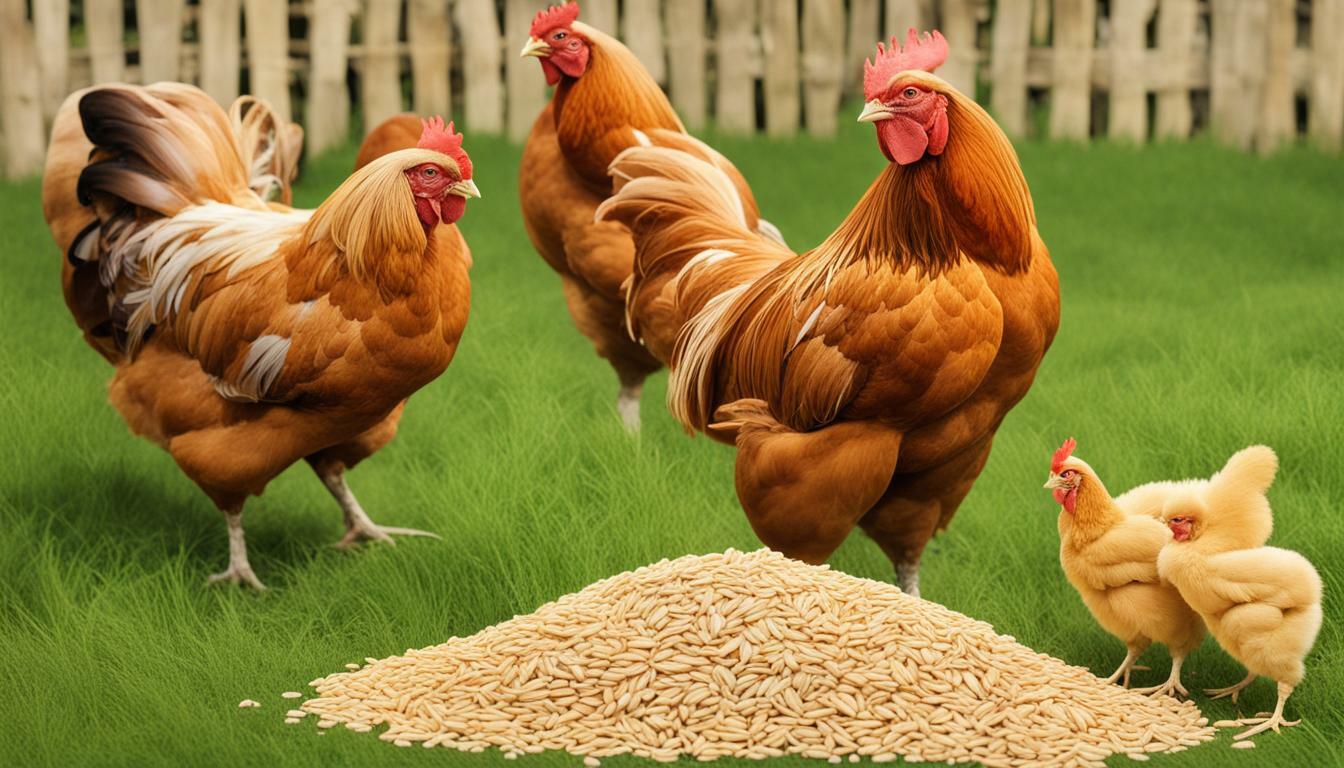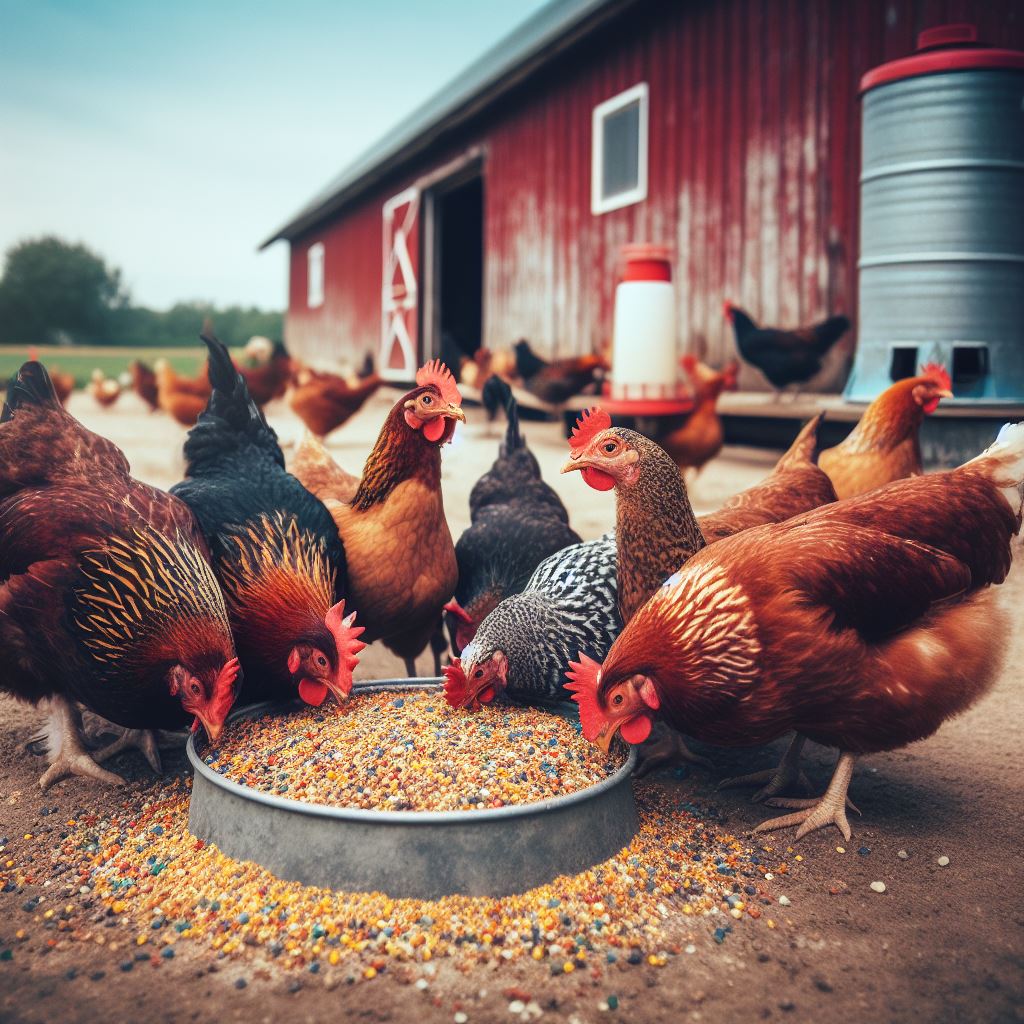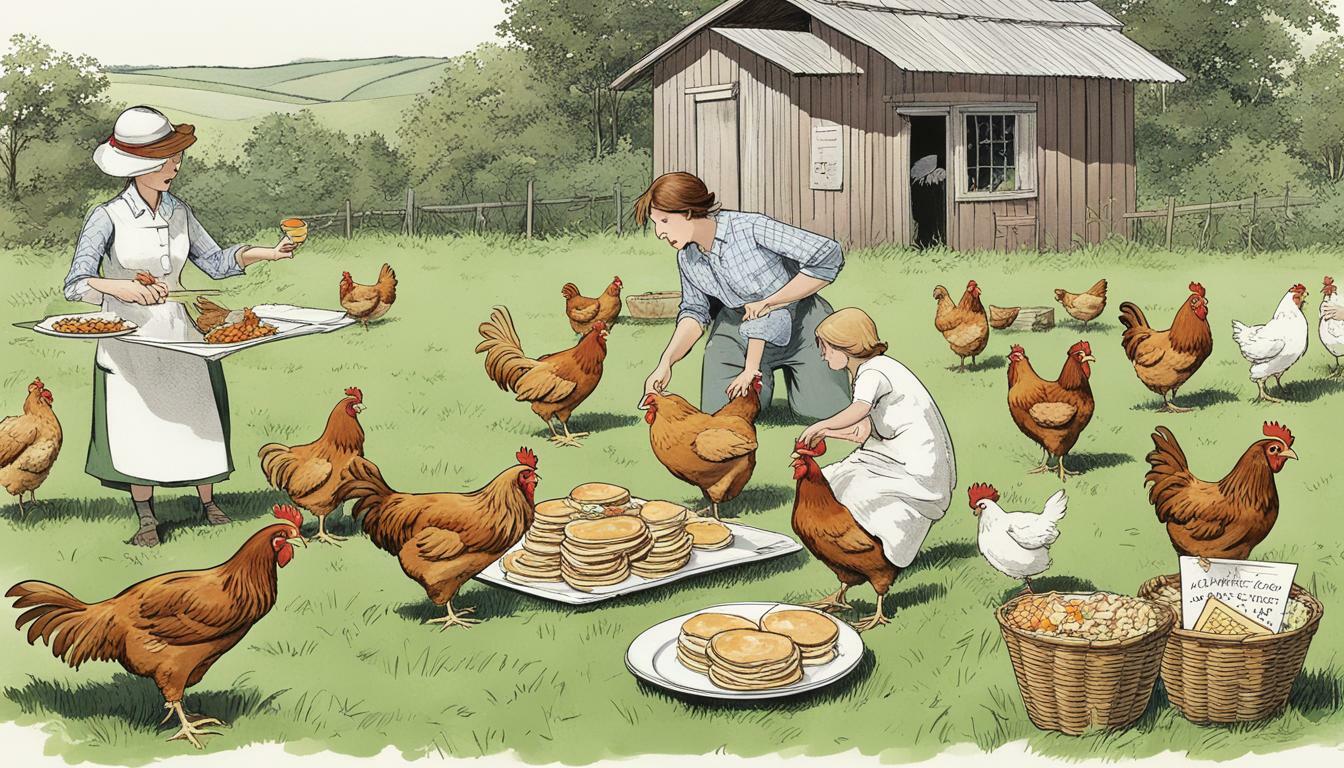Can Chickens Eat Horse Oats? Discover the Surprising Answer.

Table of content:
If you’re a chicken owner, you want to ensure you’re feeding your birds the best possible diet. One question that often comes up is whether chickens can eat horse oats. It’s a valid concern since chickens have very specific dietary needs, and feeding them the wrong food can lead to health problems.
So, can chickens eat horse oats? The answer might surprise you.
Key Takeaways:
- As a chicken owner, it’s important to understand the nutritional needs of your birds.
- Feeding your chickens the wrong foods can lead to health problems.
- The question of whether chickens can eat horse oats has a surprising answer.
Understanding Chicken Diets: What You Need to Know
If you’re a chicken owner, you know the importance of providing your feathered friends with a well-balanced diet. Feeding your chickens the right foods not only keeps them healthy, but also promotes egg production and overall vitality.
So what exactly should you be feeding your chickens? A healthy chicken diet consists of a variety of foods, including grains, proteins, fruits, and vegetables. In fact, chickens are omnivores and enjoy eating a wide range of foods.
The Basics of Feeding Chickens
When it comes to feeding your chickens, it’s important to offer a balanced diet that meets their nutritional needs. Additionally, it’s best to provide a mixture of foods to prevent boredom and to keep your chickens interested in eating.
Here are some key things to keep in mind when feeding your chickens:
- Chickens need protein to thrive. Good protein sources include poultry feed, mealworms, and even small amounts of meat scraps.
- Grains, such as corn and wheat, are also important for chickens. These can be mixed with other foods to create a balanced diet.
- Fruits and vegetables are great sources of vitamins and minerals. Offer a variety of options such as carrots, apples, and leafy greens to keep your chickens healthy.
- Be sure to provide clean water at all times. Chickens need access to fresh water to stay hydrated and healthy.
Foods to Avoid
While chickens can eat a wide range of foods, there are some things you should avoid feeding them. Some foods may not be safe for chickens, while others may cause digestive issues or other health problems.
Here are some foods to avoid feeding your chickens:
- Caffeine or chocolate: These can be toxic to chickens and may cause heart issues or even death.
- Foods high in salt or sugar: Large amounts of salt or sugar can be harmful to chickens and may lead to health problems such as obesity.
- Raw or dried beans: These contain toxins that can be harmful to chickens if not cooked properly.
- Avocado: The skin, pit, and leaves of avocados contain a toxin called persin, which can be harmful to chickens.
By understanding the basics of a healthy chicken diet and being mindful of what foods to avoid, you can keep your chickens happy, healthy, and productive.
The Nutritional Value of Oats for Chickens
Oats are a nutritious and versatile food that can provide numerous health benefits for your chickens. Not only are oats an excellent source of fiber, they also contain essential vitamins and minerals that are important for maintaining a healthy poultry diet.
The High Fiber Content of Oats
Oats are a great source of dietary fiber, which is important for maintaining proper digestion in chickens. Fiber helps regulate the digestive system and prevent issues such as blockages and impaction. Additionally, fiber can help regulate blood sugar levels and reduce the risk of obesity in chickens.
Chickens can consume oats in a variety of forms, including whole oats, rolled oats, and oatmeal. However, it is important to note that feeding chickens too many oats can cause digestive issues, so it is important to incorporate oats in moderation as part of a balanced diet.
The Essential Nutrients in Oats
In addition to their high fiber content, oats also contain essential vitamins and minerals that are important for maintaining a healthy poultry diet. These include:
- Protein: Oats are a great source of protein, which is important for maintaining strong muscles and healthy body function in chickens.
- B-Vitamins: Oats are rich in B-vitamins such as thiamin, riboflavin, and niacin, which are important for maintaining healthy skin, feathers, and nervous system function.
- Iron: Oats are a good source of iron, which is important for maintaining healthy blood function in chickens.
Overall, oats can be a valuable addition to your chicken’s diet, providing essential nutrients and fiber to promote optimal health and digestion. Just remember to incorporate oats in moderation and consult with a veterinarian or poultry nutrition expert if you have any concerns about your chicken’s diet.
Can Chickens Safely Consume Horse Oats?
If you’re considering feeding your chickens horse oats, it’s important to ensure their safety, as not all animal feeds are suitable for chickens. While some chicken owners might think that feeding them horse oats is an easy way to offer their birds a nutritious diet, it’s essential to do some research before doing so.
Potential Risks of Feeding Chickens Horse Oats
- Digestibility: Unlike chickens, horses have a digestive system that can break down fibrous feeds such as oats. Chickens have a different digestive system that might not be able to extract all the nutrients from horse oats.
- Ingredients: Horse oats usually contain added supplements and medications that are intended for horses and could be harmful to chickens.
Therefore, it’s important to be cautious when giving your chickens horse oats and to consider the potential risks.
Factors to Consider
If you still want to feed your chickens horse oats, you should take some precautions to ensure their safety:
- Sourcing: Only purchase horse oats from reputable suppliers and ensure that they are free of additives, supplements, and medications that could be harmful to your chickens.
- Processing: It’s best to avoid rolled or processed horse oats and opt for whole oats to reduce the risk of any harmful additives.
- Quantity: As with any new food, introduce horse oats gradually to your chickens’ diet and monitor their reaction. Offer them in small quantities to avoid potential digestive issues.
With these precautions in mind, you may be able to safely feed your chickens horse oats. However, it’s important to remember that there are plenty of other nutritious feeds that are safe for chickens that you can offer instead.
Healthy Alternatives to Horse Oats for Chickens
If you’re looking for nutritious and safe alternatives to horse oats for your chickens, there are plenty of options to choose from. Here are a few healthy food choices to consider:
- Fruits and vegetables: Chickens love fruits and vegetables, and they are great sources of vitamins and minerals. Try feeding them leafy greens, berries, melons, and carrots.
- Grains: There are many types of grains that are safe for chickens to eat, including wheat, barley, and quinoa. These grains are rich in protein and other essential nutrients.
- Protein sources: Chickens need protein to stay healthy, and there are plenty of safe protein sources to choose from. Try feeding them cooked eggs, mealworms, or fish.
- Herbs: Some herbs can be beneficial for chickens, such as oregano, thyme, and sage. These herbs can help boost their immune system and promote overall health.
Remember to always introduce new foods slowly and in moderation. It’s also important to make sure your chickens have access to clean water at all times. By offering a variety of foods, you can help ensure that your chickens have a balanced and nutritious diet.
Feeding Tips for Chicken Owners
If you’re a chicken owner, you know how important it is to provide your feathered friends with a healthy and balanced diet. Here are some feeding tips to help you keep your chickens happy and healthy:
Variety is key
Just like humans, chickens need a variety of foods to stay healthy. A diet that is too limited can lead to deficiencies in essential nutrients. Make sure to offer a range of foods such as grains, fruits, vegetables, and protein sources like insects or meat scraps.
Moderation is important
While it’s important to offer your chickens a variety of foods, it’s equally important to prevent overfeeding. Chickens will eat as much food as you give them, which can lead to obesity and other health problems. Follow feeding guidelines, and make sure to offer only the recommended amount of feed each day.
Consider age and activity level
The dietary needs of chickens can vary depending on their age and level of activity. Young chickens require more protein than older birds, while active birds may need more calories. Make sure to choose feed types that are appropriate for your chickens’ stage of life and take their activity level into account.
Provide plenty of fresh water
Water is essential for your chicken’s health and digestion. Make sure they always have access to fresh, clean water. Check waterers regularly to ensure they are working properly and refill as needed.
Keep treats in moderation
Treats like mealworms, scratch grains, and fruits can be a great way to supplement your chicken’s diet and provide mental stimulation. However, these should only make up a small portion of their overall diet. Treats should never replace their regular feed.
By providing your chickens with a balanced and varied diet, you can help ensure they live long and healthy lives. With these feeding tips, you can keep your feathered friends happy and thriving!
Conclusion: Feed Your Chickens Wisely
In summary, while chickens can eat horse oats, it’s essential to consider the nutritional value and safety of any food you give them. A balanced diet is crucial for keeping your chickens healthy and productive, and with a little research, you can find many nutritious options beyond horse oats.
Remember to avoid feeding your chickens foods that are high in salt, sugar, or fat and ensure they have access to fresh water at all times. Additionally, offer them a variety of foods, such as vegetables, fruits, and grains, to keep their diet diverse and interesting.
Overall, educating yourself on your chickens’ dietary needs and making informed feeding choices is key to maintaining their health and well-being. By following these tips, you can ensure that your feathered friends stay happy and healthy for years to come.
Welcome. I’m Adreena Shanum, the proud owner of this website, and I am incredibly passionate about animals, especially poultry. I founded adreenapets.com as a labor of love, stemming from my desire to share my knowledge and experiences with poultry enthusiasts worldwide.




